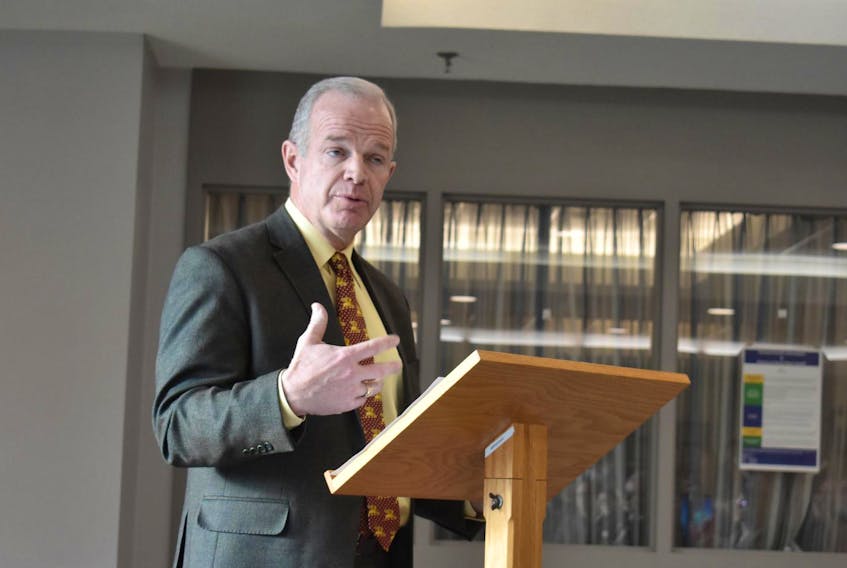When the top judge in the province accuses the attorney general of undermining the role of the chief justice of Nova Scotia, Houston is right – we have a problem.
Conservative leader Tim Houston exposed that problem this week in the legislature where he produced documents that show Justice Minister and Attorney General Mark Furey rejected the recommendation of a judicial selection committee chaired by Chief Justice Michael MacDonald. The committee was stuck at the minister’s request to recommend a chief judge for the provincial court.
The minister’s action resulted in the chief justice withdrawing from the process of appointments to the provincial court, present and future. Clearly, the chief felt the process was tainted.
Furey, in his letter to Chief Justice MacDonald requesting that the committee be struck, wrote that he respects the practice “that has been used for the past two decades, for the Governor in Council (cabinet) to seek the advice of a ‘recruitment committee’ chaired by the Chief Justice of Nova Scotia,” to select a chief for the provincial court. The quotation marks are because the committee is misnamed. It doesn’t recruit, it recommends, and when it makes a recommendation, it has been the practice of governments to accept that recommendation and with good reason.
The attorney general himself cited the reason in his letter to Chief Justice MacDonald:
“This process honours the independence of the judiciary in the selection of its Chief.”
Except that the minister didn’t honour the independent recommendation of the committee, which also included the associate chief judge of the Family Court; the president of the Provincial Judges’ Association and a member of the Advisory Committee on Provincial Judicial Appointments.
The minister’s disregard of the recommendation from the committee prompted Chief Justice MacDonald to write to the attorney general, as follows:
“Representing the common interests of each and every judge in the Province is fundamental to my role as Chief Justice of Nova Scotia. The recent Recruitment Committee process for the appointment of the Chief Judge of the Provincial and Family Courts has undermined that role.”
The criteria for selection of a chief provincial court judge directs the committee to seek and consider the views of provincial and family court judges as to the suitability of the candidates. Chief Justice MacDonald’s reference to his role representing the common interests of all judges suggests that his committee’s recommendation reflected those views.
Whitney Pier native Michael MacDonald is recognized for his outstanding legal mind and, as chief justice of Nova Scotia for 15 years – he retired Feb. 1 – he was seen as a brilliant, if cautious, jurist. In other words, he’d think long and hard before sending an incendiary letter to the province’s attorney general.
There were two candidates for chief judge of the provincial and family courts; the incumbent Judge Pam Williams and Judge Alanna Murphy. The committee recommended Judge Murphy for the post. The government appointed Judge Williams.
Furey correctly points out that the government could simply have extended Judge Williams’ tenure as chief but decided to strike a committee instead.
Be careful what you ask for, minister.
The committee recommended a new chief, which wasn’t in the minister’s plans. Because “the Committee made no comment in its report or correspondence that the (current) Chief Judge was not qualified or suitable for appointment to the office of Chief Judge,” Furey recommended Judge Williams be reappointed and cabinet approved it in August.
For decades, and in Nova Scotia since the Royal Commission Inquiry into the wrongful conviction of Mi’kmaq Donald Marshall, governments have carefully avoided the appearance of political interference in the judicial process. One way to do that is to respect and accept the recommendations of independent judicial advisory committees.
By breaking with that tradition, Tim Houston says Nova Scotia’s Liberal government has proven there is no limit to what it will do to “get its own way,” up to and including the politicization of the judicial selection process.
He noted the government has used its majority to limit the scope of legislative committee’s and is now extending its authoritarian reach to judicial appointments.
What’s clear here, is that Furey knew who his and the government’s choice for chief of the provincial court was before he struck the committee. If he expected the chief justice of Nova Scotia to provide judicial cover for that pre-determined outcome, he was sadly mistaken.
Indeed, if he tried to use the judiciary for that purpose, his suitability to serve as attorney general is in serious doubt.









